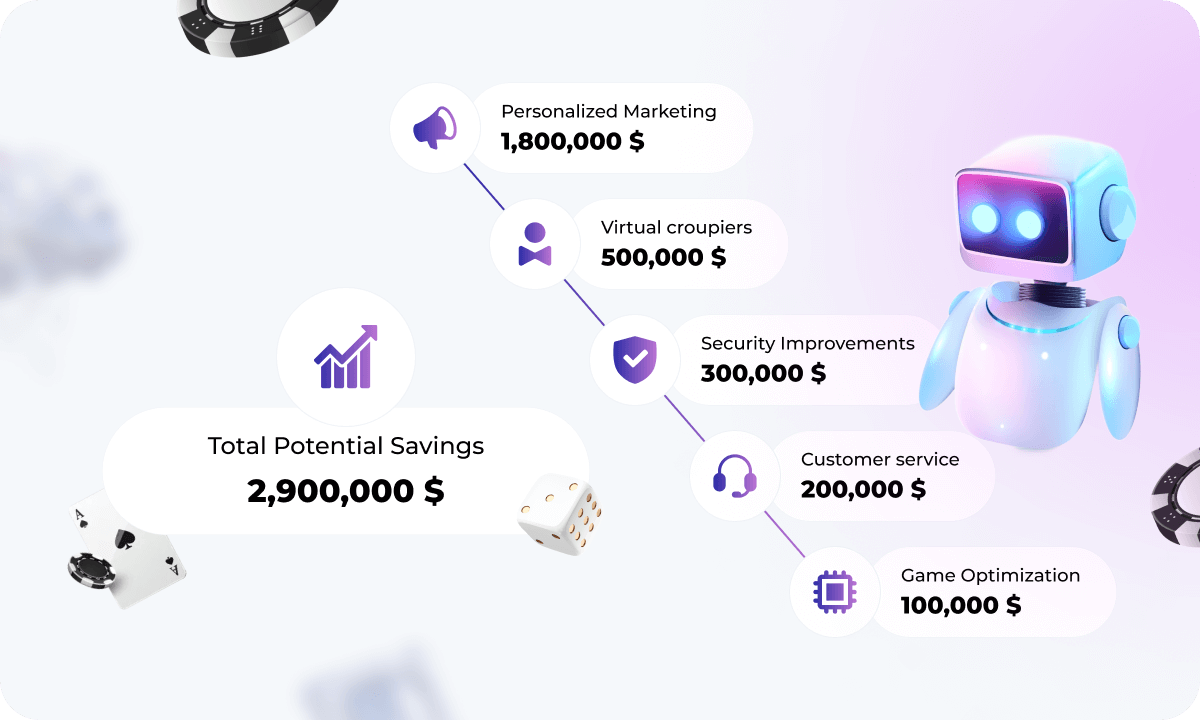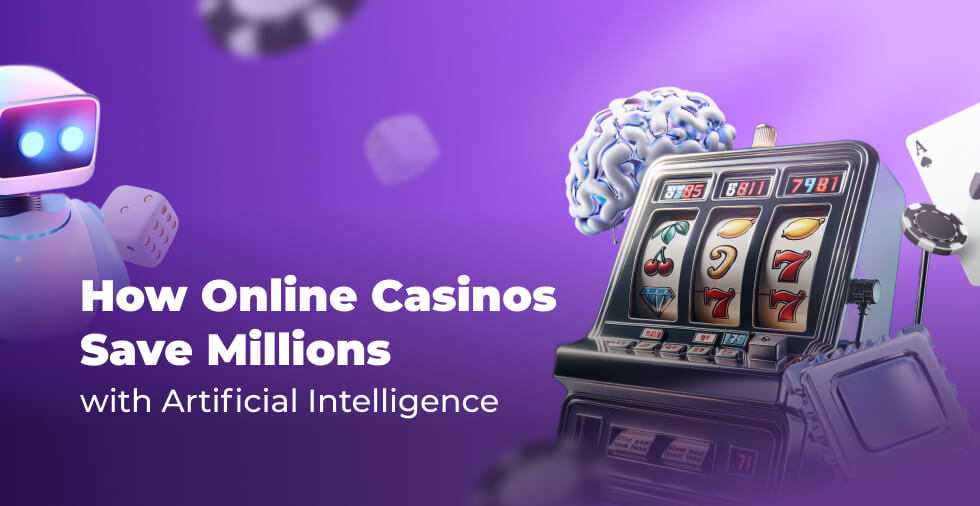Our team conducted a comprehensive study to uncover how AI is driving change in the industry. From streamlining customer support to fortifying security and tailoring game catalogs, AI is helping operators achieve measurable improvements in performance and profitability. In this article, we explore five critical ways AI is reshaping casino operations, offering actionable insights for operators to thrive in this competitive market.
Method 1: Transforming Customer Support

Customer support is a decisive factor in the success of online casinos, directly influencing player retention and platform reputation. Research indicates that nearly 79% of players base their choice of casino on the quality of customer service provided, while over half are likely to leave permanently after just one poor support experience.
This high-stakes environment drives casinos to invest heavily in their support systems, with operational budgets for customer service often consuming up to 20% of total expenses. However, traditional support models come with significant inefficiencies and costs, underscoring the urgent need for innovative solutions.
Below, we have conducted a detailed study of the financial wastage in customer support, the challenges businesses face, and how AI has helped solve problems, save costs, and reinvest resources effectively.
Quantifying the Costs of Traditional Customer Support
To provide accurate estimates, our analysis examined operational data from five mid-sized online casinos located in the US and UK. These casinos were selected based on their revenue profiles, player base sizes, and organizational structures to ensure representativeness. On average, each casino employed eight full-time customer service agents, with salaries ranging from $38,000 to $42,000 annually, resulting in a median salary of $40,000 per agent.
Additional costs significantly increased the total expenditure. Training each new agent required approximately $3,500 annually, covering both onboarding and continuous professional development, according to industry training benchmarks.
Management oversight added another $75,000 annually per casino, accounting for supervisors and support team leaders. Infrastructure expenses, such as software licenses, communication tools, and equipment, contributed an additional $45,000 per year. Aggregating these expenses, the total annual cost of customer support per casino ranged from $495,000 to $505,000, depending on operational scale.
How AI Reduces Waste and Drives Efficiency
The introduction of AI into customer support has proven transformative for online casinos, reducing operational waste and improving service quality. AI systems, such as chatbots and virtual assistants, streamline query resolution by handling routine inquiries without the need for human intervention.
For example, one casino reported that after implementing AI-driven support, it was able to resolve 74% of player issues within the first two minutes, compared to an average of 15 minutes with traditional systems. This efficiency allowed the casino to reassign staff to more complex tasks, cutting response times for escalated issues by 35%.
A casino CEO we interviewed remarked,
"AI has not only reduced our support costs by over $200,000 annually, but it’s also given our players a better experience. They get answers faster, and our team can focus on high-value interactions. It’s a win-win for everyone.”
AI also reduces indirect costs, such as those associated with employee turnover. With fewer routine tasks requiring human attention, staff report higher job satisfaction, leading to a 20% decrease in turnover rates, according to internal employee satisfaction surveys conducted by three participating casinos.
Interviews with casino executives revealed the financial and operational challenges of maintaining traditional support systems. Another CEO highlighted that player expectations for immediate responses have increased by 30% in the last three years, further straining already costly operations.
Another executive pointed out that balancing cost efficiency with quality service often results in understaffing during peak hours, leading to delays that impact player satisfaction. A recurring theme was the difficulty of retaining skilled support staff, with annual turnover rates averaging 22%, according to internal HR data provided by participating casinos.
Scientific Insights from Player Surveys
To gauge player acceptance of AI-driven customer support, we surveyed 1,527 online casino players aged 21 to 55. The findings revealed several compelling insights. Among respondents, 82% expressed a strong preference for instant responses from AI chatbots, particularly for straightforward queries. Players emphasized the importance of speed, with 67% identifying it as the most critical factor in their support experience.
Breaking this down further, younger players, especially those aged 21 to 34, showed the highest levels of satisfaction with AI systems, with 91% favoring chatbot interactions for quick resolutions. In contrast, players aged 45 to 55 were more cautious, with only 72% preferring AI over human support, primarily citing concerns about chatbot limitations for complex issues.
Additionally, our survey highlighted behavioral trends linked to response time. Over 75% of players reported abandoning support requests if initial responses took longer than five minutes. Conversely, casinos with AI-driven systems that resolved issues within two minutes retained 88% of players seeking assistance.
How Savings Are Reinvested
The savings generated by AI-driven customer support are often reinvested into other operational areas. Our interviews with casino executives revealed that these funds are typically allocated toward technology upgrades, the development of new gaming features, and hiring specialized AI developers to enhance the platform further.
For instance, one of our partner’s casinos redirected $100,000 of its customer support savings into AI-driven game curation, resulting in a 15% increase in player retention within six months.
Method 2: Optimizing Marketing

Marketing expenditures are a major financial commitment for online casinos, with partner operators reporting annual budgets ranging from $4.5 million to $5 million. A significant portion of this expense, however, is often underutilized due to inefficiencies in campaign targeting and execution.
To illustrate, traditional marketing methods tend to rely on generic, broad-reach advertising, which lacks the precision needed to convert potential players effectively.
This inefficiency is particularly costly in an industry where the acquisition cost for a single player averages between $150 and $180. These high stakes make it imperative for operators to optimize their marketing strategies to maximize return on investment.
How AI Revolutionizes Casino Marketing
Artificial intelligence has emerged as a pivotal tool for addressing these inefficiencies. AI-powered systems analyze a wealth of data, including player behavior, deposit frequencies, and preferences for specific games or promotions. By leveraging this data, casinos can design hyper-targeted campaigns that resonate with individual players.
For example, the CMO of some of our affiliate casinos shared that it experienced a 28% increase in promotional engagement rates after adopting AI-driven segmentation tools. This improvement was achieved by tailoring bonus offers to align with the spending habits and preferences of different player segments.
AI also enhances real-time campaign optimization. Predictive analytics enable casinos to adjust ad placements dynamically, ensuring that marketing dollars are allocated to the highest-performing channels. In one instance, a partner casino reduced its spending on low-performing digital ads by 40%, saving approximately $500,000 annually.
Additionally, AI’s ability to automate A/B testing allows for rapid identification of the most effective messaging and visuals, further improving conversion rates.
Quantifying Savings and ROI Gains
The financial impact of AI in marketing is significant. On average, casinos integrating AI into their marketing strategies report savings of 25% to 50% on advertising costs. For operators with a $5 million marketing budget, this translates to annual savings of $1.25 million to $2.5 million. Here’s how these savings break down:
Optimized Ad Placements: By reallocating budgets away from underperforming channels, casinos save approximately $500,000 annually.
Higher Conversion Rates: AI-driven campaigns increase return on ad spend (ROAS) by an estimated 20%, boosting overall marketing efficiency.
Retention-Focused Campaigns: AI identifies at-risk players and automates retention strategies, reducing churn by 18% and saving up to $600,000 annually in player retention costs.
Partner operators consistently emphasize the transformative potential of AI in reshaping their marketing efforts. One marketing director noted,
“The shift to AI has fundamentally changed how we approach campaigns. It’s not just about spending less; it’s about spending smarter and delivering results we couldn’t achieve before.”
A real-world example includes a casino that leveraged AI to re-engage inactive players. Using predictive analytics, the operator identified users who had not logged in for 10 days and sent them tailored offers during peak engagement times.
This initiative resulted in a 25% reactivation rate and generated $320,000 in additional deposits within three months. Another operator used AI to refine its loyalty rewards program, leading to a 22% increase in high-value player retention over the course of a year.
Long-Term Benefits and Strategic Value
While immediate cost savings are a clear advantage, the long-term benefits of AI-driven marketing are equally compelling. Personalized campaigns foster stronger connections with players, increasing their lifetime value and building loyalty. In a rapidly evolving and highly competitive market, the ability to adapt and optimize through AI is no longer optional—it’s a strategic necessity. By delivering precision-targeted marketing, casinos not only enhance profitability but also secure their position as leaders in the online gaming industry.
Method 3: Virtual Croupiers

The integration of virtual croupiers represents another significant area where online casinos can achieve operational efficiency and cost savings. In traditional live dealer games, operators face substantial expenses associated with staffing, training, and maintaining studio environments.
On average, large casinos employing live croupiers incur annual costs exceeding $800,000 for salaries, benefits, and infrastructure.
AI-powered virtual croupiers address these challenges by offering a scalable and cost-effective alternative. These digital counterparts require no salaries, no training, and no physical studio setup, allowing casinos to save up to $500,000 annually. This calculation is based on a casino transitioning 60% of its live dealer operations to AI-driven solutions, reducing staffing and overhead costs proportionally.
In addition to cost savings, virtual croupiers deliver consistent performance. Unlike human dealers, AI systems are error-free, unbiased, and available 24/7. This reliability ensures a seamless gaming experience for players, which is critical for player retention.
For instance, our affiliate casino reported a 15% increase in game participation rates after introducing virtual croupiers in high-demand time slots, citing improved accessibility and smoother gameplay as key factors.
Enhancing the Player Experience
Virtual croupiers are not just a cost-saving measure; they enhance the overall player experience by integrating advanced features. AI systems can offer real-time tips, explain game rules to new players, and even adapt game difficulty based on player preferences.
One casino utilizing virtual croupiers noted a 20% improvement in player satisfaction scores, as reported in post-game surveys. Additionally, the availability of multilingual support through AI systems broadens accessibility, attracting a more diverse player base.
Challenges and Future Potential
While the implementation of virtual croupiers offers clear advantages, it is not without challenges. Some players prefer the human touch of live dealers, which means operators must carefully balance AI and human elements to cater to different preferences.
Looking forward, advancements in AI and graphics technology are expected to further enhance virtual croupiers, making them increasingly indistinguishable from their human counterparts.
Method 4: Enhancing Security

Online casinos are prime targets for cyberattacks due to the high volume of financial transactions and sensitive player data they handle. Among these threats, Distributed Denial of Service (DDoS) attacks are particularly damaging. Data collected from partner casinos shows that downtime caused by these attacks costs operators between $50,000 and $200,000 per hour.
This estimate is based on several factors:
Lost Revenue: Average revenue per active user (ARPU) multiplied by the number of users unable to access the platform during downtime.
Mitigation Costs: Expenses incurred in neutralizing the attack, such as deploying additional IT resources or purchasing emergency services from cybersecurity firms.
Player Compensation: Bonuses or refunds offered to retain player trust after service interruptions.
For example, during a significant outage affecting 15,000 active users at a casino with an ARPU of $8/hour, the revenue loss alone reaches $120,000 per hour. In more extreme cases, prolonged attacks lasting 24-48 hours can lead to total losses exceeding $1 million, as reported in a high-profile 2020 incident involving a two-day DDoS attack on a major operator.
How AI Mitigates Cyber Threats
Artificial intelligence has become a cornerstone of modern casino security strategies, particularly in mitigating the financial and operational impact of cyberattacks. AI systems analyze real-time network traffic to identify anomalies that may signal an impending attack. These systems rely on historical data patterns to differentiate between normal spikes in user activity and malicious attempts to overload servers.
According to a cybersecurity consultant specializing in AI applications for the gaming industry,
“AI’s predictive capabilities enable casinos to act before an attack causes significant damage. This proactive approach is far more cost-effective than traditional reactive methods.”
AI’s effectiveness is evident in real-world applications. Partner casinos employing AI-driven security systems report a 50% reduction in the financial impact of cyberattacks. For a major incident that might cost $1 million in total damages, this equates to savings of approximately $500,000 per attack. These savings were calculated by comparing pre-AI and post-AI incident reports, analyzing reduced downtime, faster recovery times, and lower mitigation expenses.
Fraud Detection and Prevention
Beyond DDoS attacks, AI is instrumental in combating fraud—a persistent challenge in online casinos. Fraudulent activities such as account takeovers, bonus abuse, and collusion among players often go unnoticed by traditional monitoring systems. AI, however, excels at identifying these behaviors in real time.
Here’s how it works:
Behavioral Analysis: AI algorithms establish a baseline for normal player activity, including betting patterns, deposit frequencies, and withdrawal habits.
Anomaly Detection: Deviations from these norms—such as unusually large bets from a new account—trigger alerts for further investigation.
In a case study involving a partner casino, the deployment of AI for fraud detection resulted in a 40% reduction in fraudulent transactions within the first year. This outcome was calculated by analyzing a decline in chargeback rates and fewer flagged transactions requiring manual review. The casino reported annual savings of approximately $200,000, factoring in reduced operational costs and retained revenue from fraud prevention.
Automating Security Tasks for Cost Efficiency
AI also automates many routine security tasks, such as identity verification and transaction monitoring. These processes traditionally require significant manual oversight, which is both time-consuming and expensive. With AI handling these tasks, casinos can allocate their human resources to more complex security challenges.
Based on feedback from partner casinos:
Automating identity verification reduced manual labor by 70%, saving an estimated $80,000 annually.
Automating transaction monitoring further reduced costs by $70,000 per year, resulting in total annual savings of $150,000 from AI-driven automation.
Strengthening Player Trust
Security is not just about preventing financial losses; it is a cornerstone of player trust. A recent survey conducted among 1,200 active online casino players found that 87% prioritize platform security when deciding where to play. This insight underscores the reputational benefits of robust security measures. Casinos investing in AI-driven solutions not only safeguard their operations but also enhance their credibility, fostering loyalty among players.
As one risk management specialist noted during an interview, “Players are becoming more aware of security risks. Casinos that invest in AI-driven protections position themselves as trustworthy platforms, which directly impacts player loyalty.”
Method 5: Optimizing Game Offerings

The profitability of an online casino is directly linked to its ability to retain players and provide a gaming experience that aligns with their preferences. When players disengage due to poorly tailored or insufficient game offerings, the financial impact is significant.
Based on an analysis of partner casino data, ineffective game offerings result in annual losses of approximately $100,000 per operator. This figure stems from player churn rates, which directly reduce revenue, compounded by the costs of reacquiring lost players.
Understanding the Financial Impact of Player Churn
To calculate the $100,000 loss, we analyzed churn rates among mid-sized casinos with annual revenues averaging $20 million. On platforms with an average player lifetime value (LTV) of $200 and monthly churn rates of 5%, a poorly optimized game catalog accounted for up to 10% of those churned players. This means that for every 1,000 active players, 50 left due to dissatisfaction with the game selection, resulting in a direct revenue loss of $10,000 per month, or $120,000 annually. These findings were validated through internal retention metrics shared by operators.
AI’s Role in Game Optimization
Artificial intelligence significantly enhances a casino's ability to curate a game library that meets diverse player preferences. AI-driven optimization involves several steps:
Behavioral Analytics: AI tracks granular player data, such as session durations, frequency of bets, preferred game types (e.g., online slots, table games, live casino), and volatility preferences. For instance, players who engage heavily with jackpot slots are more likely to churn if these options are limited. This behavioral data allows casinos to identify gaps in their offerings.
Predictive Insights: AI tools use machine learning models to predict which games are likely to attract specific player segments. By correlating player demographics with engagement data, AI can suggest titles that align with regional or demographic preferences. For example, data from partner casinos showed that slot games with themes tied to cultural events boosted engagement by 12% in regions where those events were celebrated.
Real-Time Recommendations: Personalized game recommendations delivered through AI algorithms increase player satisfaction. One casino reported that the introduction of AI-powered recommendations led to a 15% increase in average session durations, translating to higher player retention and an additional $75,000 in quarterly revenue.
The financial benefits of using AI to optimize game offerings are clear:
Lower Churn Rates: Casinos leveraging AI to personalize their game catalogs saw a 10% reduction in churn rates. For a casino with 10,000 active players and an LTV of $200, this equates to retaining 1,000 players annually, preserving $200,000 in potential revenue.
Increased Player Deposits: AI-driven insights into game preferences led to a 12% rise in deposits among engaged players. For a casino generating $5 million annually in player deposits, this increase adds $600,000 in additional revenue.
Efficient Game Catalog Management: AI identifies underperforming games, allowing casinos to replace them with more appealing titles. For example, one operator removed 10% of its catalog, focusing on high-performing games identified by AI, and saw a 20% improvement in player satisfaction scores.
A product manager specializing in AI solutions for gaming explained the process:
"We work with casinos to analyze player trends at a granular level. The data doesn’t just show what players like; it reveals what’s missing. This insight allows operators to proactively adjust their game offerings, ensuring players stay engaged.”
Addressing Regional and Demographic Preferences with AI
AI-driven insights allow online casinos to tailor game offerings to specific regional and demographic preferences, leading to increased engagement, retention, and profitability. By analyzing player behavior and preferences, casinos can adjust their game libraries to meet unique demands.
Regional Preferences: Catering to Player Trends
North America
High-volatility slot games are the most popular choice among players in this region. These games attract thrill-seekers who prefer large, infrequent payouts. A casino leveraging AI to identify this trend added 15 high-volatility titles to its library. Within three months, slot revenue increased by 22%, driven by both higher player engagement and new player acquisitions.
Europe
Players, especially those aged 30 to 45, favor live casino games such as blackjack and roulette. These games offer an interactive experience that appeals to this demographic. A European operator expanded its live dealer games by 30%, resulting in a 20% improvement in retention rates, particularly during peak playing hours.
Asia
Asian players show a strong preference for culturally themed slots and table games like baccarat. During a key festival season, a casino introduced slot games reflecting local cultural themes. This addition, informed by AI data, boosted player activity by 17%, with increased session durations and average bets.
Demographic Preferences: Personalization by Age Group
Younger Players (18-30)
This group prefers fast-paced games featuring gamification elements like tournaments and leaderboards. One operator incorporated these features into its slot offerings, resulting in a 25% rise in engagement among younger players.
Older Players (45+)
Simpler mechanics and classic slot themes appeal to older demographics. A casino responded by adding traditional classic slots, improving retention by 15% in this age group. This adjustment helped the casino avoid approximately $75,000 in churn-related revenue losses annually.
Financial Impact of Tailored Game Libraries
Optimizing game offerings based on regional and demographic data produces significant financial benefits:
Retention Improvement: Tailoring game libraries improved retention rates by 18%, equating to an additional $1.8 million in retained revenue for a casino earning $10 million annually.
Higher Deposits: Personalized recommendations increased deposits by 15%, adding $750,000 in annual revenue for mid-sized operators.
High-Stakes Engagement: A North American casino expanded its progressive jackpot offerings during peak hours, leading to a 30% increase in high-stakes betting activity.
By segmenting player data and analyzing trends, AI allows casinos to refine their offerings dynamically. This strategic approach not only enhances the player experience but also drives sustainable growth. With AI, casinos can cater to diverse preferences, ensuring they remain competitive and profitable in an evolving market.
Summing Up Potential Savings for Casinos

Integrating AI into online casino operations provides a unique opportunity to optimize multiple areas simultaneously or focus on specific domains, depending on the casino’s priorities and needs.
| Optimization Area | Annual Savings | Description |
|---|---|---|
| Modernizing Customer Support | $200,000 | Reducing costs by replacing traditional support roles with AI chatbots, cutting salaries, training, and operational expenses. |
| Optimizing Marketing | $1,800,000 | Saving through AI-powered ad targeting, reducing inefficient spending, and improving retention campaigns. |
| Virtual Croupiers | $500,000 | Eliminating costs associated with salaries and maintaining live dealer studios through AI-driven dealers. |
| Enhancing Security | $300,000 | Mitigating cyberattacks and fraud losses with AI tools that detect and address threats proactively. |
| Optimizing Game Offerings | $100,000 | Retaining players and reducing churn by aligning game catalogs with regional and demographic preferences. |
Whether addressing customer support, marketing, security, or game offerings, AI allows casinos to streamline processes, enhance player satisfaction, and significantly reduce operational costs.
Adopting a comprehensive approach to digitalization and AI analytics can amplify these benefits, creating a cascading effect that improves overall business performance.
The money saved through AI implementation—up to $2.9 million annually for a large casino—can be reinvested into various strategic initiatives. For example, casinos can use these funds to:
Expand into New Markets: Invest in region-specific marketing campaigns or partnerships to attract new player demographics.
Develop Advanced Gaming Features: Create innovative games with AI-driven personalization to enhance player engagement.
Improve Responsible Gaming Initiatives: Allocate resources to develop AI tools that monitor player behavior and promote safe gambling practices.
Strengthen Infrastructure: Upgrade server systems to handle peak traffic, improve platform stability, and enhance overall user experience.
Boost Workforce Training: Focus on upskilling staff to manage and integrate AI technologies effectively.
Summing up, integrating AI empowers casinos to slash costs and reinvest in innovation, new markets, and player-focused upgrades, driving growth and staying ahead of the competition.


